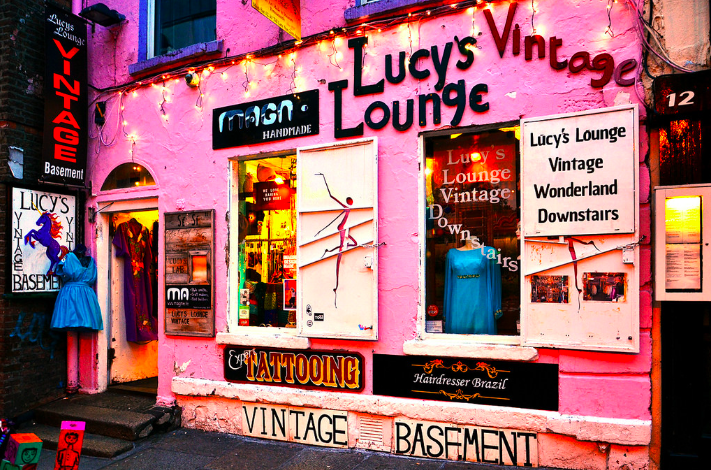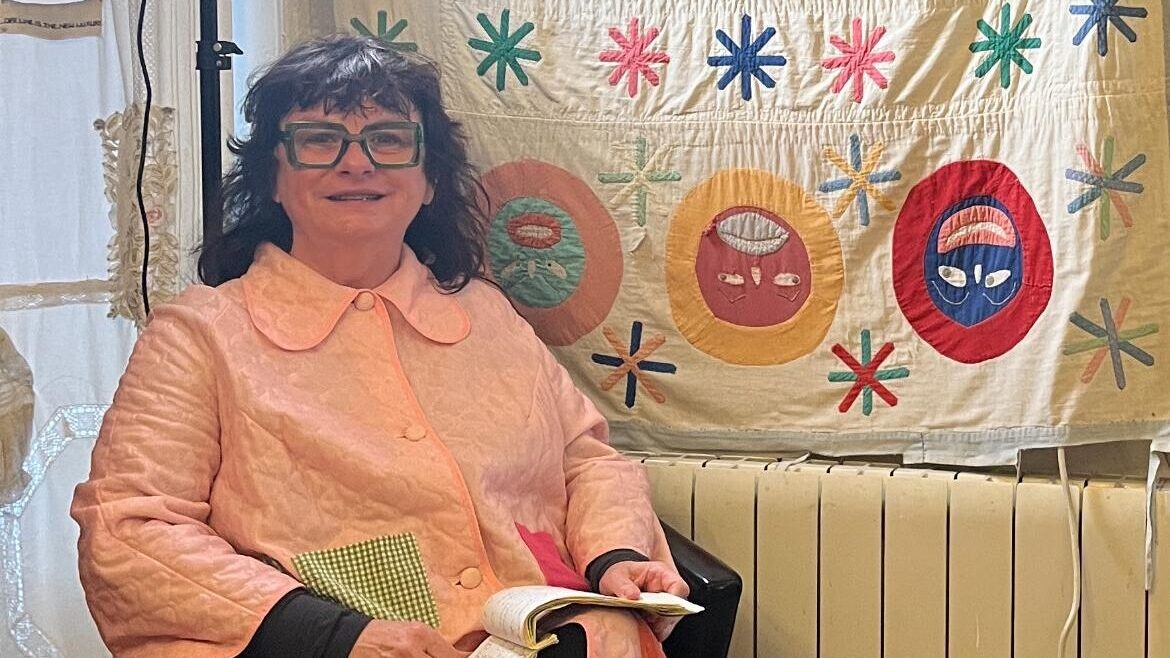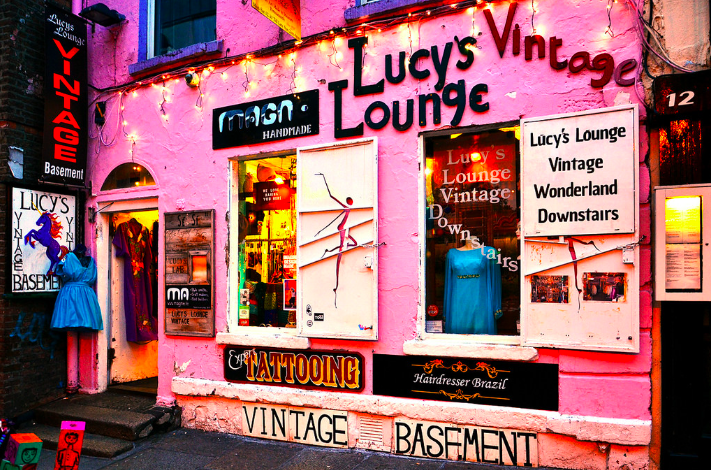By Saoirse MacCarthy

Lucy’s Lounge, located in the heart of Temple Bar, has been operating since 1987, owned by the lovely and eccentric Deirdre Macken.
Deirdre has had the unique and lucky experience of finding her life’s calling at a young age, she joked, calling herself a “one-trick pony.” But as mundane as that may sound, it is magical to have a purpose. “A good witch put a spell on me when I was 17 years of age,” she “genuinely just loves clothes. I love every aspect of clothes, and I love people. I love the people who come into the shop. I love everything about it.” She admits running a business does not come without its challenges, but “I’m so grateful that I was able to have that business.”
Leaving school at 17 in 1982, Deirdre, who was a new romantic at the time, was the “next step from punk. So, new romantics really dressed up very theatrically.” This theatrical style has only poured out of her; the shopfront is painted pink, and as you walk in, colours fill every corner of the shopfloor.
Back in 1982, “Ireland was a completely different place then.” She recalls that at the time, the smart kids went into the civil service and that most of her class went on to do secretarial work. Dierdre said there were no jobs in the 80s in Ireland. Nothing was happening.” But that didn’t stop young Dierdre from having fun; there was a teenage disco called “The Apartment” in Dublin City, where the new romantics would frequent. New romantics would wear second-hand clothes, which were very difficult to come across at the time; this inspired creativity and lots of DIY. Wearing second-hand clothes wasn’t so trendy at the time. Dierdre recalled the clothes being described as dirty and looked down upon; she didn’t care.
The creativity she was surrounded by inspired her to start selling second-hand clothes. Living in Dublin 8, Dierdre would walk to the Francis Street Ivy Market and buy as many clothes as she could. And then walk down to what was Fleet Street and set up a stall at the teenage discos to sell clothes to all her new romantic friends.
“I had a pram that I would push the clothes into town and sell them. I would buy the clothes. I would bring them home.”
She then moved onto a stall in Mary Street Arcade, “which is opposite Marks and Spencer’s. It was called Mary Street Arcade, I think that’s Henry Street, but for some reason they called it Mary Street Arcade.”
As the business grew, it became a family affair. Dierdre’s family would help her wash and iron every item of clothing she bought, turning the family home into a laundrette.
“I was an only child who was reared with two uncles, a granny and my mother and father. So, I was completely and utterly spoiled. So, anything they could do for me, they would do, you know.”
There were no limits for Dierdre and her entrepreneurship, “I just kept doing it. And after a while, I did leave and go to London. But even in London, I did the clothes. I sold at Camden Market or Portobello Market.” She said London was extremely kind to her and that she expanded her knowledge by taking part in different business courses. Most importantly,” It was much more taken seriously as a business.” There were lots of like-minded young people also selling second-hand clothes, the banks would lend to you, and estate agents would give you a shop.
After a couple of years, she returned home and opened Lucy’s Lounge. “It was Friday the 13th, November 1987.”
From there, the business grew very quickly. During the 90s, she had five shops with different specialities. “I had one shop selling second-hand. One shop sold ethnic clothes, so clothes from Guatemala, Nepal, and India. And another shop selling Irish designers, just all fresh Irish designers and young designers.” Dublin began resembling the Dublin of today, Temple Bar was developed, and young people began opening businesses, pumping life into the city.
The 90s were a very exciting time in Ireland.
“It was like in the 80s, we were asleep, but we were slowly waking up. But we were fully awake in the 90s.”
Dierdre has always made sure to put back into her community, employing local young people and helping people upskill and enter the fashion industry. Employees of hers have gone on to work for big names such as GUCCI. When the 2008 recession hit, Lucy’s Lounge ran a programme where they taught people how to sew for free for a year.
After 37 years in business, Dierdre has become a much-loved character in Dublin’s Fashion scene.
For the third year of Dublin Independent Fashion Week, she was invited by the organisers to host “A Chat with Lucy”.” A podcast interviewing featuring interviews with owners of various vintage businesses from Dublin. “Over 5 nights, 5 vintage friends, 5 questions, 5 show-and-tells.” The interviews were with Tola Vintage, And Again Clothing, Dandelion, and Jenny Vanders. Dierdre said that the organisers of DIFW are long-time customers of her shop and they “just came in and said, look, you’re going so long. We’d love you to do something. We’d love you to be involved.” Interviewees brought home-cooked soup and rocky road treats to share with the audience. Deirdre described the interviews as “people are coming in, a little snack, and we’re having a chat.” The interview room was set up with colourful tapestries on each wall and mannequin dressed in clothing Dierdre’s husband, Rory, sewed downstairs on the shopfloor.

Dierdre wanted to platform other lovers of vintage fashion to encourage people to get involved in second-hand clothes, nurture their creativity and make their shopping habits more sustainable. Interviewees of Dierdre’s podcast came from both Ireland and abroad. She’s enlivened about the future of Irish creativity.
“I grew up in a very Irish Ireland, you know, white Irish Ireland, whereas now we’ve got so many amazing influences from other cultures and people who’ve grown up here.
People have a different way of looking at things or a different way of designing. And that’s bringing a huge fresh energy into everything.”
Her excitement for the future of vintage clothing is evident. She believes in the “new batch of young vintage people who are selling, and they are really presenting the clothes as an alternative to high street. You can go into a shop and you can get a beautiful outfit that’s washed, ironed, repaired, and you can just put it on you.” As the cost of fast fashion is becoming more apparent on the planet and in people’s pockets, second-hand is often the more affordable and guilt-free option.
Dierdre has great faith in what’s to come for the Irish fashion industry: “little things like little acorns, big trees grow.”
Dierdre’s career has been an inspiration for many aspiring vintage business entrepreneurs, and her influence is now immortalised in her DIFW podcasts. Her love and passion were evident in every interview. Dierdre will be making the Podcasts available in the time to come.
To keep up to date with Lucy’s Lounge, you can follow them on Instagram @lucyslounge
